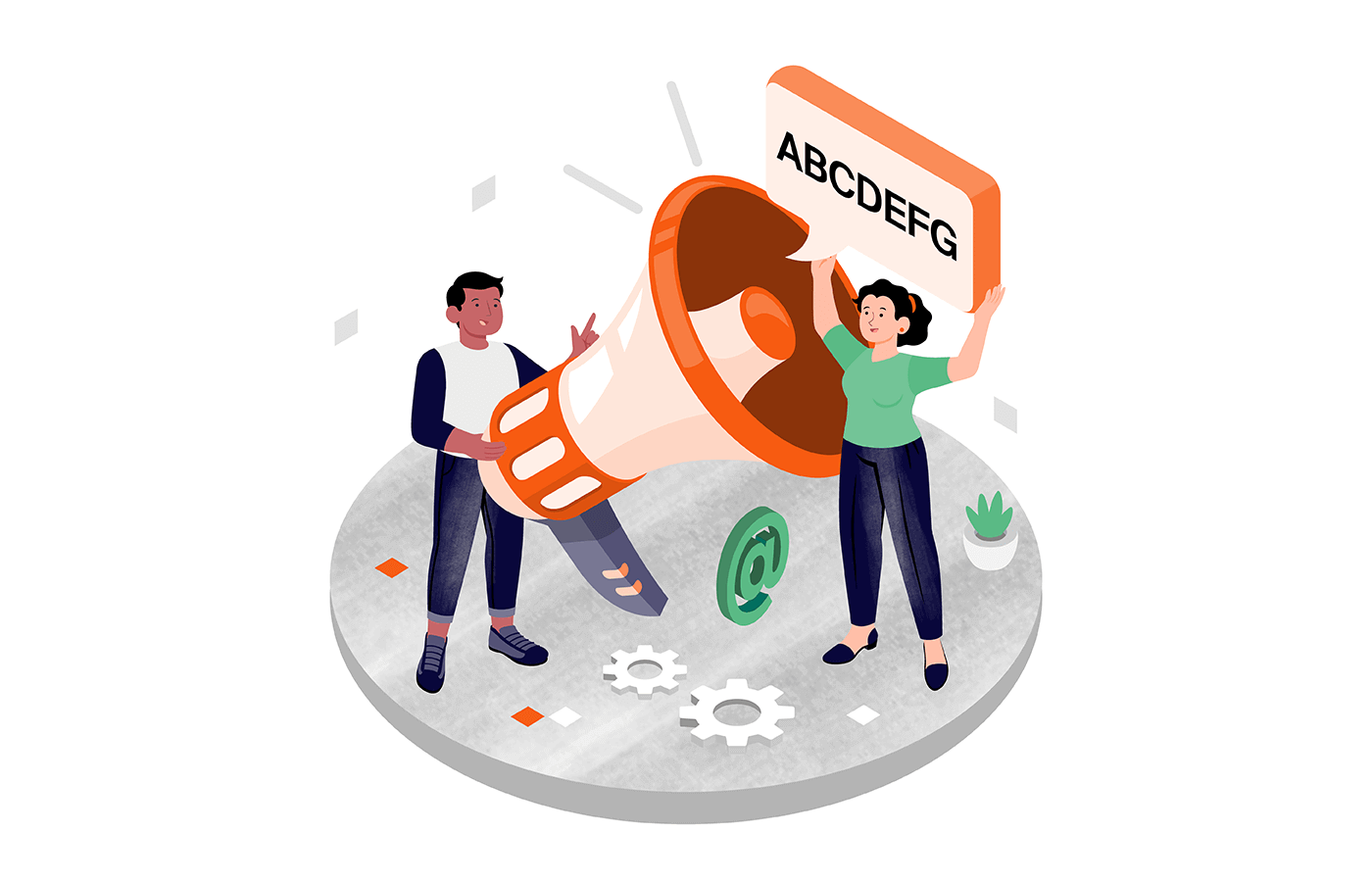Through the years, email (electronic mail) has continued to be one of the most effective sales tools online. In fact, 41% of marketers find email as their most effective marketing channel.
That’s not to say that email marketing is as easy as it was before. More and more recipients are starting to see the patterns and signs, and it’s time brands and companies adjust and adapt.
One of the most important things you should learn as a business that does email marketing and email outreach is how to write irresistible email subject lines. In this article, we look at some reasons why subject lines matter and guiding principles around email subject line capitalization.
Let’s dive in.
Why Email Subject Lines Matter
Email subject lines are undoubtedly important in email advertising and marketing. Mainly, it helps you reach and resonate with your target audience through outreach emails, but there’s more to that. Here are five reasons why email subject lines matter:
First Impressions Count
Email subject lines are the first piece of content your recipient sees. Accordingly, 33% of email recipients will open an email if the subject line is catchy. A good subject line can grab the attention of readers and encourage them to open the email. Most importantly, it’s your only chance to make an impression in a recipient’s inbox.
Bodycare brand Billie serves the perfect example of a compelling subject line and an email that doesn’t disappoint when you open it:
Subject line: Wanna smell like: 🌸🍊🌊🌹?
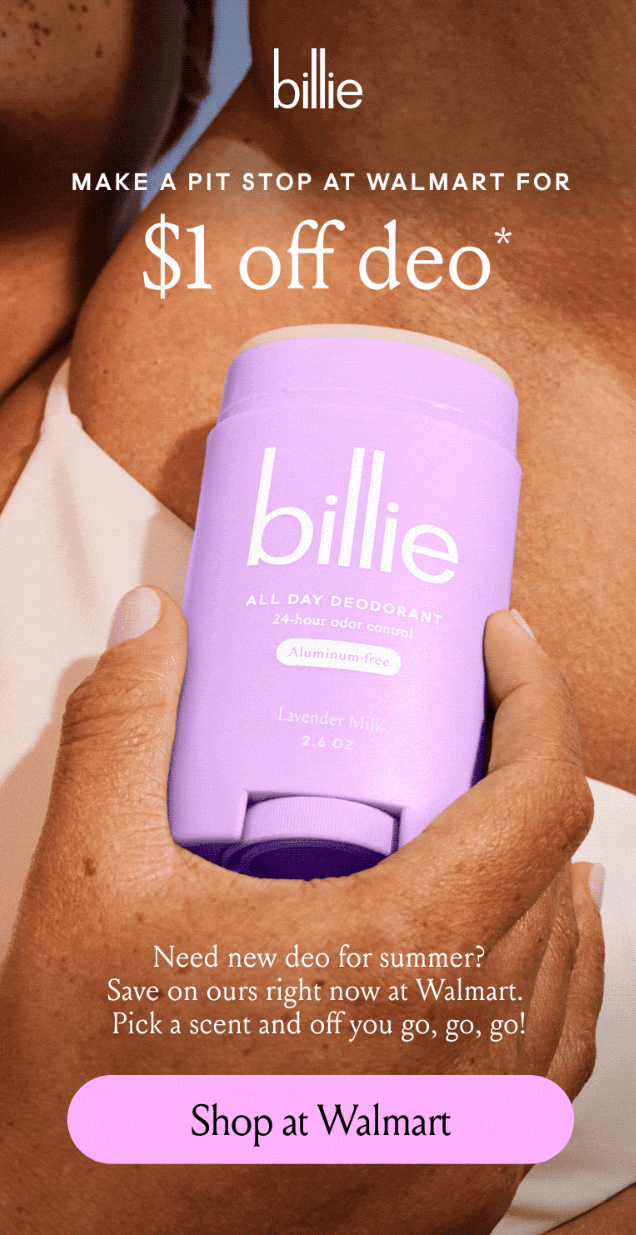
Clarity and Context
A clear and concise subject line will give the email’s recipients a preview of the email’s content. So, it’s best to choose a title case or sentence case for your email subject capitalization based on your recipient’s intent and perception.
The title case tends to stand out more, whereas the sentence case can seem more casual and approachable. More on that later.
For now, here’s an example of a loud and clear subject line from Starbucks, following with a concise and straightforward email copy.
Subject line: Friday = 50% off your drink 😎

Personalization and Engagement
Including proper nouns or personalizing email subject lines with the recipient’s name or relevant details can increase engagement rates.
This technique makes the email feel more tailored to the individual. Keep in mind that emails with personalized subject lines boast open rates of 30.26%, compared to non-personalized email subject lines that have an average open rate of 16.67%.
Here’s a great example of a personalized email and subject line from Netflix. They have not only added recipient’s name in the subject line, but also personalized it according to the content they have recently watched.
Subject line: Smiles Davis, we just added a docuseries you might like
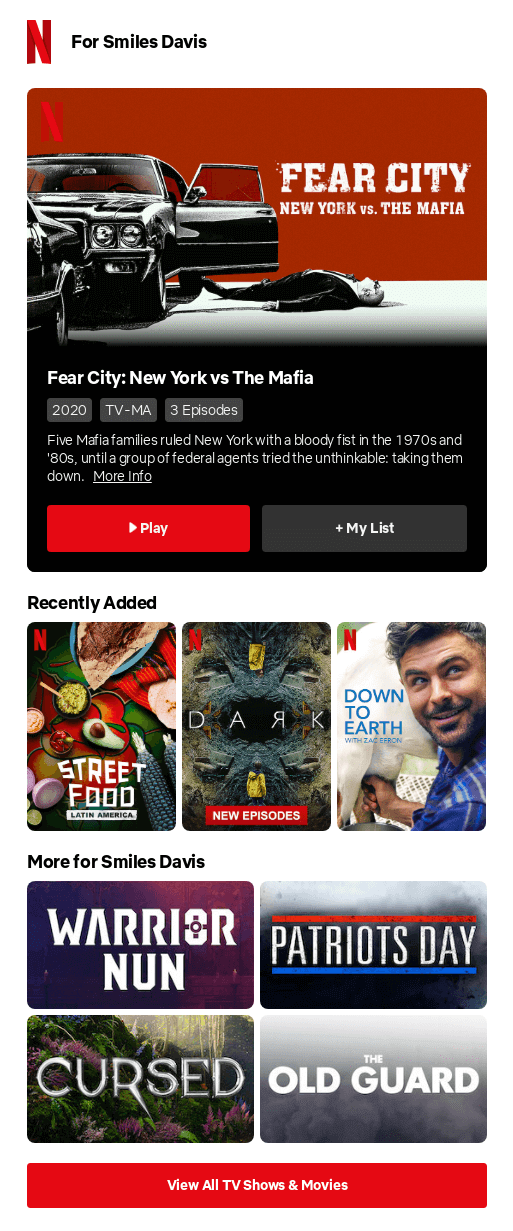
Want to send personalized newsletters that look great on any screen? Just use one of Sender’s free templates, simply edit the text and you’re good to go!

Testing and Optimization
Experimenting with a different capitalization writing style in your email outreach campaigns or cold email efforts can help you understand what resonates best with your audience.
Try A/B testing various elements, such as the presence of long subject lines versus short ones.
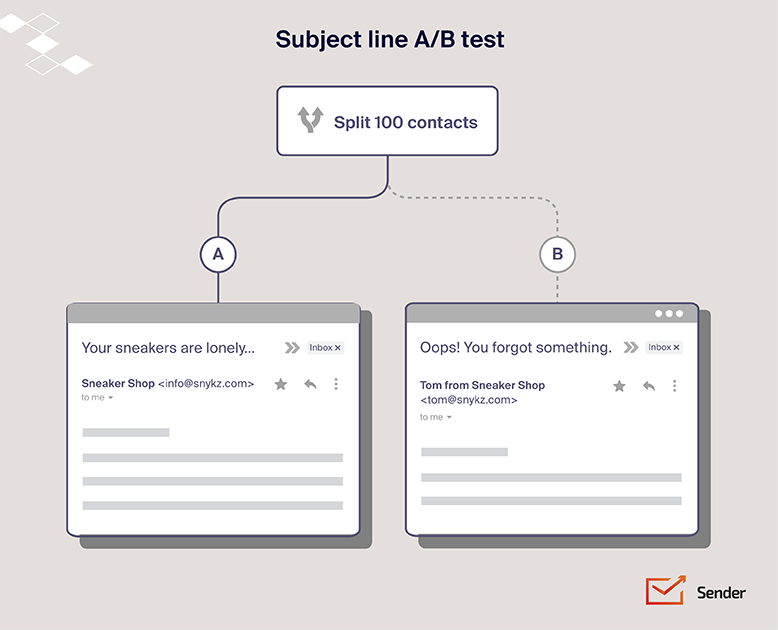
Avoid the Spam Folder
70% of email recipients report an email as spam based on the subject line. Today, using certain trigger words or excessive punctuation can alert spam filters that divert your message away from the intended inbox.
Here are some common spam triggers in email subject lines:
- All caps: Using ALL CAPS in the subject line;
- Excessive punctuation: Multiple exclamation marks or question marks (e.g., “!!!”, “???”);
- Sales language: Terms like “Buy now”, “Order now”, “Free”, “Act now”;
- Urgency words: Phrases like “Hurry”, “Urgent”, “Don’t miss out”;
- Financial terms: Words such as “Earn money”, “Make money fast”, “Get rich”;
- Overuse of symbols: Using too many symbols like $, %, &, #;
- Misleading claims: Statements like “You won”, “Claim your prize”, “You are a winner”;
- Too good to be true offers: Phrases like “100% free”, “Risk-free”;
- Personalization gone wrong: Improper use of merge tags or placeholders (e.g., “[Name]”);
- Suspicious formatting: Unusual spacing, special characters to evade filters (e.g., “Fr**ee”, “B^u^y N^o^w”).
Email subject lines help your messages capture the necessary attention amidst a cluttered digital environment. This gives your subject line a direct impact on your communication efforts’ effectiveness.
Should You Capitalize an Email Subject Line?
Here’s a question that doesn’t get enough answers. What are capitalization rules around email subject lines, and which is better? Should you make outreach email templates and messages with capitalized email subject lines? Do sentence cases matter?
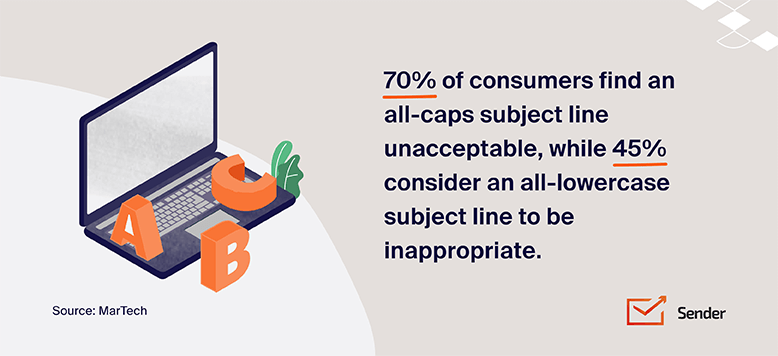
Both title case and sentence case have their advantages. So, your choice between them should align with the tone of your message and your brand’s style. Let’s break down when and why you might use each:
1) Title Case
In the title case, you will capitalize all or most of the first letters in every word. This style is common in more formal contexts. Using this can convey a sense of importance or professionalism.
Advantages:
- Professional tone: Title case can make an email subject line appear more formal or polished, which might be appropriate for business communications or important announcements.
- Attention-grabbing: Capitalized titles often stand out more in your recipient’s inbox, potentially increasing open rates.
Use Case:
- Formal announcements: “Join Our Webinar: The Future of Digital Marketing”
- Newsletters: “This Week’s Top Tech Innovations Unveiled”
2) Sentence Case
Sentence case in email outreach means capitalizing only the first letter of the first word, along with any proper nouns, which makes the email seem more casual and conversational.
Advantages:
- Friendly and relatable: Using sentence cases can make an email feel less formal and more like a conversation, which might be appealing in B2C communications.
- Ease of reading: Some find sentence cases easier to read quickly, which is great for lead generation among busy prospects.
Use Case:
- Casual updates: “I never knew this update from Google existed…”
- Personal messages: “Thanks for joining our webinar, Gary!”
Capitalization Rules for Email Subjects
A few well-known capitalization rules work across copywriting, journalism, and email writing circles. They apply to most forms of writing, whether a blog post, script, or email.
Here they are and how they work:
| Style | Description | Applications |
| APA Style | Title case is used for works that are part of a larger body, and sentence case for standalone works. | Marketing and outreach emails, depending on content/context |
| Chicago Manual of Style | Headline-style capitalization for titles and headings. | Titles and headings in various documents |
| MLA Style | Title case for titles. | Email subject lines, especially in academic contexts |
| Associated Press (AP) Style | Sentence case for titles and headings. | More casual capitalization for titles and headings |
Best Practices for Capitalizing Email Subjects
When choosing your capitalization approach in your email subjects, it’s important to follow these best practices for better results.
1. Choose the Right Capitalization Style
Decide between title and sentence case based on the tone you want to set and the audience you’re addressing. It might help to categorize based on your intended recipient’s context.
Title cases can lend a sense of formality and importance. On the other hand, sentence cases can make the email feel more casual and approachable.
Use the choice that aligns with your brand voice and the content of the message. Correct capitalization is crucial in writing, especially for formal or academic texts, such as in education master’s programs.
2. Be Consistent
Consistency in your email subject line capitalization will help you establish a more reliable image. It avoids confusing your recipients and gives them a sense of familiarity.
Once you choose a style, stick to it throughout your communications for a while. This will help you build a more solid brand identity among your recipients.
On top of that, make sure your email is accurate throughout. Check for any broken link or spelling problem that could illicit anything but a positive response.
3. Avoid Over-Capitalization
Avoid capitalizing every letter in an email subject line. Using all caps can come across as obnoxious, which can be off-putting to most recipients. It may also trigger spam filters, which will lessen the chances of your email reaching your recipient’s inbox.
4. Capitalize Proper Nouns and Names
Always capitalize proper nouns and specific names. That includes brand names, locations, people’s names, and others. It’s generally the grammatically correct thing to do and sounds more respectful.
It also shows attention to detail. Make sure to double-check your email if you’re using an outreach email template. You could miss some proper names from time to time.
5. Test and Optimize
What works for one audience might not work for another. So, regularly testing different capitalization styles can provide insights into your specific audience’s preferences.
Whether you’re running a cold email outreach or a resource page outreach, results can vary. It helps to conduct A/B tests on small segments of your audience to see which capitalization style leads to better open rates.
Double down on cold emails that convert the best. But remember that consistency still has a big effect. So, stick to that for a good while once you find the best approach.
Also read: What is Customer Segmentation? Definition, Examples & Tools
Frequently Asked Questions (FAQs)
Should subject lines be capitalized in an email outreach?
Capitalizing subject lines in emails often depends on the context of the message, the intended audience, and the overall branding style of the sender. There’s no one-size-fits-all answer. It largely depends on the factors mentioned above.
Adjusting your approach based on the situation and continuously evaluating the results is key to finding what works best for your specific circumstances.
Can capitalization styles be mixed in subject lines for outreach emails?
Mixing capitalization styles in email subject lines can be a strategic choice, but it requires careful consideration to ensure the message remains clear and professional. Overuse of mixed capitalization can make the text confusing. It can also sometimes appear unprofessional or casual.
Do all style guides advocate capitalizing email subjects?
Not all style guides explicitly advocate for capitalizing email subjects in the same way, as recommendations can vary based on the purpose of the communication, the audience, and the stylistic preferences of the organization.
Also read: 120+ Email Newsletter Subject Line Examples
